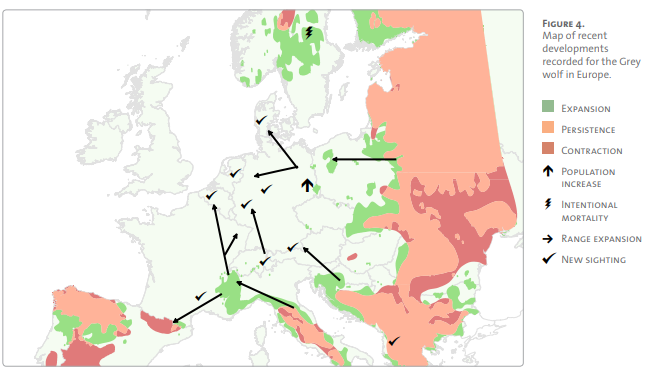On the 4th September 2023 the European Commission spread a Press Release about wolves in Europe. Many reacted with indignation to the Press Release, including Mammal Conservation Europe.
In the Press Release the European Commission urges local authorities to make full use of existing derogations and collects data for conservation status review. The motive for this request is the reports about wolves killing sheep in Western and Central Europe. This is to be anticipated given that many activities and management practices have evolved over recent decades, in the absence of large carnivores in the Western and Central European landscape. As noted in the Commission’s Press Release, such conflicts occur ‘especially where measures to prevent attacks on livestock are not widely implemented’.
Following centuries of persecution, wolf populations are currently recovering in many EU countries. It expands its range from East-European populations towards the west. This is largely a consequence of social, economic and land-use factors, including reforestation and the progressive abandonment of agricultural land, but it has also been supported by legislation to protect the species.

Unlike the citizens in areas where wolves survived and thrived until now, citizens and especially herdsmen in Central and Western Europe forgot how to live together with wolves. For example, in Romania, a country with a large wolf population, there isn’t much human-wolf conflict thanks to dedicated conflict management measures to prevent damage by wolves. These measure should also be taken in the new recolonised countries. Actually, this is already happening (see for example Wolf Fencing Team Belgium, Wolven in Nederland and Herdenschutz Niedersachsen) but apparently not yet known by everybody. Therefore, it is far too early to question the current conservation status, as the Commission does in her Press Release. Also, the wording of the Press Release, which ‘urges local authorities to make full use of existing derogations’, without any reference to the Mitigation Hierarchy and the Habitats Directive’s clear guidance that derogations should be used only as a last resort when other measures have failed, is very disappointing. Therefore, Mammal Conservation Europe, a partnership of seven European nature conservation organisations for the protection of European mammals, has written to Ursula von der Leyen, President of the European Commission, and Nicola Notaro, Head of the Commission’s Directorate General for Environment to express its reservations and to ask for further information on how current shortcomings will be addressed. You find the letter here: MCE wolf response letter.
See also:






